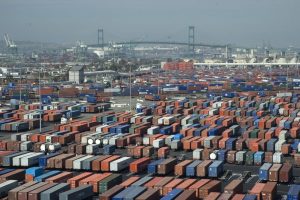Coronavirus Effect on Ports Update
 There have been concerns with all the shutdowns happening to fight the spread of COVID-19, the novel Wuhan coronavirus, that ports are also closing. It’s not surprising people would think ports are shut down, as people all over the country are being asked or even mandated to stay at home and practice social distancing while businesses, schools, and churches are temporarily closed to avoid coronavirus spread. In Santa Clara county, where I live and fortunately already work remotely from home, a shelter-in-place order has been put into effect. However, leaving home for essential reasons is allowed and essential businesses are still open. Among essential businesses, exempt from the mandate to close their doors, are shipping businesses.
There have been concerns with all the shutdowns happening to fight the spread of COVID-19, the novel Wuhan coronavirus, that ports are also closing. It’s not surprising people would think ports are shut down, as people all over the country are being asked or even mandated to stay at home and practice social distancing while businesses, schools, and churches are temporarily closed to avoid coronavirus spread. In Santa Clara county, where I live and fortunately already work remotely from home, a shelter-in-place order has been put into effect. However, leaving home for essential reasons is allowed and essential businesses are still open. Among essential businesses, exempt from the mandate to close their doors, are shipping businesses.
American shippers should know and be confident in the fact that ports are, of course, part of the shipping industry and are, therefore, still open.
In fact, the Port of Los Angeles released a video yesterday (Wednesday, March 18th), in which Port of Los Angeles Executive Director Gene Seroka opens with the strong statement, “… the Port of Los Angeles is open for business and don’t let anyone tell you otherwise.”
Of course, that’s not to say the ports do not have struggles with COVID-19. In fact, jumping to the opposite coast where the Ports of New York and New Jersey are, the man at the head of the port authority has tested positive for the coronavirus.
New York Gov. Andrew Cuomo announced Monday that Rick Cotton, executive director of the Port Authority of New York and New Jersey (PANYNJ), had tested positive for the coronavirus and was under quarantine.
That certainly has not closed those top ports on the East Coast. Of course, those who have worked closely with Cotton are being tested and working from home now and Cotton himself is self quarantined and asymptomatic, according to the article.
In the video above, Seroka says, “Thanks in large part to ongoing communications and vigilance in the areas of self health monitoring and social distancing in the workplace, there have been no land-side impacts to operations by COVID-19 in [the Port of Los Angeles] complex at this time.”
Indeed, the Port of Los Angeles reports on its website states, “There are currently no reports of any vessel impacts due to COVID-19 at any of the Port of Los Angeles terminals.” However, it is hard to understand how Seroka defines “land-side impacts to operations” as there certainly have been impacts at the ports, specifically at the Ports of Los Angeles and Long Beach, due to the coronavirus.
In fact, on the very same Q&A page that contained the above quote, the following is stated:
According to the most recent figures released by the PMA, work shifts at the ports of Los Angeles and Long Beach have declined since the beginning of the year as compared to this time last year.
We even posted an article a couple weeks ago about COVID-19-related detention fees shippers face from their inability to return empty containers because of the build-up of such containers and shift cancellations at the Ports of Los Angeles after the coronavirus outbreak extended the Spring Festival Holiday shutdown of manufacturing in China and resulted in so many blank sailings.
Since then, large container ships have been deployed to clear that backlog of empty containers and get the Ports of Los Angeles and Long Beach in a better place to handle a more normal amount of cargo.
China has actually been able to get the outbreak of COVID-19 under control enough to return the country back to manufacturing production. That likely plays a large role in the Port of Los Angeles reporting that cargo volumes are at 85% of normal volumes.
Of course, as China returned to a more normal state of production, COVID-19 moved into a full pandemic, continuing its spread in countries all over the globe, including, of course, the U.S. Certainly, that will shrink the amount of American exports shippers are and will be sending to the ports.
That does not mean that importing and exporting is over. There are plenty of shippers, including many of Universal Cargo’s own valued customers, who still need to get cargo exported out or imported in. The ports are operating for you and so is Universal Cargo.




